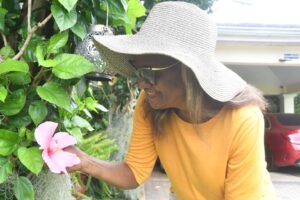
From Denmark to Spanish Town: The Foska Story
Foska Oats may be a breakfast staple across generations of Jamaicans, but few know that the brand was once owned by American cereal giant Kellogg’s and that its production was nearly pulled from the island.
Today, nearly six decades later, it remains in local hands as a result of a bold decision made by one Jamaican family in the 1960s. The family-run business behind the brand, Caribbean Foods Limited, is still producing rolled oats out of its Twickenham Park facility in Spanish Town, even as it navigates rising competition, shifting global supply chains, and changing consumer tastes.
Christopher Ramson, managing director and part of the third generation to steer the company, recalls how it all began.
“Chas E Ramson was the original distribution company that was formed by my grandfather back in 1922. As a distributor, we were doing business with Kellogg’s, and at the time, Kellogg’s only had cornflakes,” Ramson told the Jamaica Observer during an exclusive interview and factory tour.
“That relationship grew into a partnership and a venture that my grandfather formed with Kellogg’s to manufacture Foska. Originally, the brand was made in Denmark, but my grandfather saw the opportunity and decided it was far more lucrative to make the product here in Jamaica.”
In 1966, a joint venture was formed between Kellogg’s and the Ramsons to launch local manufacturing under the new company, Caribbean Foods Limited.
Business between the partners went on for some time, but after a few years, Kellogg’s indicated it wanted to move the manufacturing process back to Denmark. Rather than let the brand disappear or fall back into full importation, the Ramson family stepped in.
“My grandfather gathered the family together, and everyone pooled what they had to buy Kellogg’s out,” Ramson recalled. That decision secured local ownership of the brand, and Foska has remained Jamaican-made ever since.
Today, Caribbean Foods is the only local producer of rolled oats from raw grain, cooking and flaking the product on-site before packaging it for distribution. That process hasn’t changed much over the years, and it remains one of the few food manufacturing operations in Jamaica that transforms raw agricultural input into a finished consumer good.
Ramson, in detailing the process, told the Business Observer that Foska oats begin as whole grain groats, imported from suppliers in Canada and Chile. When the raw oats arrive, they’re nothing like the soft flakes that end up in supermarket boxes — they’re small, hard, and nearly inedible without treatment.
“We steam-cook the grain, then press and flatten it into the flakes that people recognise,” he explained. “That’s what gives Foska its texture.”
While the core process has remained largely intact since the 1960s, the company has introduced operational efficiencies over time, including recycling residual steam to reduce energy use and refining its packaging lines.
Ramson also credits the quality of Jamaica’s water for contributing to the product’s flavour. “We use Jamaican water. It’s good-quality water. That actually contributes to the final flavour profile, and it’s part of what sets us apart,” he said.
Caribbean Foods currently produces a range of Foska-branded oats in multiple sizes and formats from its 12,000-square-foot factory in the Twickenham Industrial complex in Spanish Town, St Catherine.
The core product — rolled oats — is available in printed bags (185 grams) and boxed options ranging from 225 grams to 800 grams. There’s also a value-size box containing two inner bags, and a separate Old Fashioned oats line sold exclusively in a 400-gram box.
In response to demand for convenience, the company introduced instant oatmeal cups in original, banana, and almond flavours, as well as a line of instant cornmeal cups in vanilla, banana, and cinnamon. More recently, the company added oat milk to its portfolio, tapping into the fast-growing non-dairy beverage market.
While not all of these products are made in-house, some are co-packed using Foska’s raw materials.
“The cup instant oatmeal and cornmeal products are made for us, using our products,” Ramson said. “There’s a co-packer we use here in Jamaica. We send them our rolled oats, and they use that to make our product for us. It’s a different recipe formula specific to Foska oats.”
Foska’s market cuts across age, income, and geography. Locally, the oats are used in school feeding programmes, correctional institutions, hotels, and households, serving everyone from young children to athletes and the elderly.
“It’s a good base, a good foundation for the morning, and it’s affordable,” Ramson said, noting its popularity among sports teams and health-conscious consumers.
The Scandinavin boy on the box
Still, the brand’s most loyal buyers are the ones who grew up with it. The flagship boxed oats remain its top seller, driven by familiarity and trust.
“The box is by far our biggest seller. People have grown familiar with the Scandinavian boy on the box and they ask all the time if he’s part of our family. He’s not. That was the original image from when it was produced in Denmark, but we’ve kept it because it’s distinctive and people know that it’s Foska their picking once they see that image,” Ramson said.
Foska also exports throughout the Caribbean and to diaspora-heavy US markets, where the product is stocked in chains like Publix and Walmart. “Anywhere that you find Jamaicans, you’ll find Foska,” he added.
Caribbean Foods’ factory operates on a single shift, five days a week. But while the space is compact, Ramson said it’s run with remarkable efficiency.
“We don’t have a lot of warehouse space at the moment, but that’s something we are actively working on. Everything we produce moves quickly. Export containers are packed to order — nothing sits for long.”
That just-in-time model has its risks, especially with ongoing supply chain volatility. In response, the company is now building out an additional 10,000 square feet of storage space. The aim is not just to house finished goods but to hold raw materials — grain, laminates, cartons, tape — in larger volumes.
“We want to double our storage capacity so we can weather any kind of disruption in the supply chain,” Ramson said. “COVID has taught us that you can’t wait until there’s a crisis to prepare. You have to be ahead of it.”
That preparation also ties into pricing strategy. With oats and packaging costs subject to global swings, the company has adopted a pre-buying model to lock in lower prices where possible.
“Inventory is a buffer not just against stockouts, but against price volatility,” he said. “The only way to hold your price steady for the consumer is to manage your input costs smartly, and that takes space.”
Beyond storage, the company is looking to expand production lines — not necessarily to make more rolled oats, but to introduce new oat-based products. Granola, baked snacks, cookies, and oat-based beverages are all under consideration.
“There are plans where we want to expand into different types of manufacturing, not just rolled oats,” Ramson said. “We’d love to do more using the oats… more finished products made right here.”
However, those ambitions are somewhat tempered by the realities of infrastructure and market dynamics. While there’s room on the property to double capacity, any expansion would require capital, equipment, and long-term demand to justify the investment.
“We need some protection from the Jamaican Government to help us keep out these large factories that have bigger economies of scale and can come in here with only a five per cent duty. And then the retailer or wholesaler is allowed to sell it in a bag that has no labelling information, no nutritional content information, no overheads, no health and safety inspections. And so it’s hard,” Ramson said.
“You can’t compete against somebody like that. But we’re working on it,” he continued.
For now, the focus is on getting extra storage in place and maintaining efficiency before bringing new products to market.


























